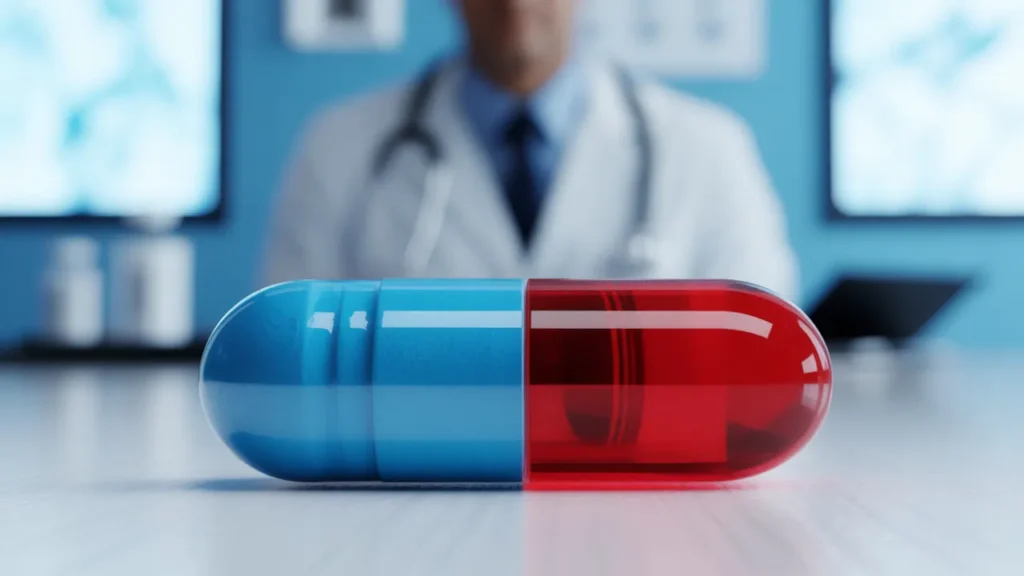ADHD and Depression
Attention Deficit Hyperactivity Disorder (ADHD) and depression frequently occur together, a condition known as comorbidity. This combination deeply affects attention, emotion, and executive functions. It influences behavior, motivation, and overall mental health.

ADHD and Depression Comorbidity
Comorbidity means a patient is diagnosed with more than one disorder simultaneously. ADHD and major depressive disorder (MDD) frequently co-occur across all age groups. Research from the Centers for Disease Control and Prevention confirms this link, especially in adolescent and adult populations.
ADHD and Depression Prevalence
Cohort studies show a high prevalence of ADHD and depression appearing together. One meta-analysis noted that patients with attention deficit hyperactivity disorder have up to five times the risk of developing major depressive disorder. The presence of both can worsen emotional dysregulation and impulsivity.
Disease Burden
This comorbidity increases the disease burden and complicates mental health treatment. It can disrupt schooling, work performance, relationships, and physical health. Patients may also struggle with bipolar disorder, substance use, or anxiety disorder.
Shared and Overlapping Symptoms
ADHD and depression affect different brain regions but often show similar symptoms. These include low motivation, poor concentration, and emotional instability. Both conditions are linked to impairments in executive functions like working memory, attention, and decision-making.
Emotional and Behavioral Similarities
Patients with depression anxiety and ADHD may display sadness, irritability, social withdrawal, and anhedonia. Emotional dysregulation may lead to psychomotor agitation or periods of mania if bipolar disorder is present. Eating habits, appetite, and sleep patterns often change, which further impacts physical and mental health.

ADHD and Depression in Adults
Adults with ADHD and depression report difficulty focusing, managing time, and coping with stress. Missed deadlines, career instability, and impulsive decisions can lead to grief and emotional exhaustion. These individuals are more likely to experience personality disorder symptoms, particularly borderline personality disorder.
Neurodiversity and Misdiagnosis
Due to overlapping traits, ADHD is sometimes misdiagnosed as generalized anxiety disorder or a mood disorder. Understanding neurodiversity helps clinicians distinguish between symptoms of ADHD and major depressive disorder. The diagnostic and statistical manual of mental disorders (DSM-5) guides proper assessment.
ADHD and Depression in Teens
Teens face unique challenges with ADHD and depression. They may experience academic failure, social rejection, and oppositional defiant disorder. Irritability, aggression, and withdrawal can be misunderstood as behavioral issues rather than signs of a mood disorder or anxiety disorder.
Suicide Risk and Early Intervention
The combination of ADHD and depression raises the risk of suicidal ideation. Emotional pain, social exclusion, and chronic stress contribute to despair. Suicide prevention strategies require education, therapy, and psychiatric support to reduce risk factors and improve resilience.
Diagnosing Comorbid ADHD and Depression
A mental health professional must assess both conditions carefully. According to the diagnostic and statistical manual of mental disorders, diagnosis includes interviews, behavior ratings, and historical review. Comorbidity is confirmed when symptoms meet full criteria for each disorder independently.
Evaluating Emotional and Cognitive Symptoms
An accurate diagnosis considers concentration issues, anhedonia, low mood, and executive dysfunction. Comorbid conditions like schizophrenia, bipolar disorder, or personality disorder must also be ruled out. A full psychiatric and medical evaluation helps prevent misdiagnosis.
The Brain and Reward System Dysfunction
The brain’s reward system is central to understanding ADHD and depression. People with ADHD may struggle with delayed gratification due to underactive dopamine pathways. Depression affects the same reward system, reducing pleasure responses and increasing apathy.
Executive Functions and Mood
Deficits in working memory and goal-directed behavior worsen mood. When executive functions fail, frustration, fear, and guilt grow. Emotional dysregulation becomes more likely, making coping strategies harder to use in daily life.
Medication Options
ADHD depression treatment often includes medication. Stimulants are common for ADHD, while antidepressants target mood disorder symptoms. For patients with both, clinicians may prescribe bupropion or atomoxetine. These drugs can improve attention and treat depression simultaneously.
Choosing the Best Medicine for Depression and ADHD
The best medicine for depression and ADHD varies by patient. Bupropion supports both dopamine and norepinephrine systems. Atomoxetine, a non-stimulant, is FDA-approved for ADHD and may help patients with depression anxiety and ADHD symptoms.
Monitoring Treatment Progress
Medication must be closely monitored by a psychiatrist or physician. Side effects like appetite loss, insomnia, or psychomotor agitation should be addressed. Mental health professionals should assess the balance between benefit and risk throughout treatment.

Therapy for ADHD and Depression
Therapy is an essential component of ADHD depression treatment. Cognitive Behavioral Therapy (CBT) addresses procrastination, irrational thoughts, and negative self-talk. Dialectical Behavior Therapy (DBT) improves emotion regulation and distress tolerance.
Therapy vs. Medication: A Combined Approach
Both therapy and medication are effective on their own. However, research shows that combining the two leads to better outcomes. Therapy helps patients manage behavior, reframe thoughts, and reduce impulsive or self-destructive patterns.
Lifestyle Strategies and Self-Care
Lifestyle changes can support treatment and improve mental health. Exercise increases endorphins and enhances dopamine release. Proper nutrition stabilizes blood sugar and supports brain function. Sleep hygiene reduces fatigue and strengthens emotional control.
Coping and Daily Management
Stress management skills are vital for patients with ADHD and depression. Techniques include setting alarms, using planners, and building predictable routines. Avoiding alcohol and other substances helps prevent mood instability and relapse.
ADHD, Depression, and Personality Disorders
Many patients with comorbid ADHD and depression show signs of personality disorder treatment. Borderline personality disorder often overlaps, especially in young adults. Emotional instability, fear of abandonment, and impulsivity appear in all three conditions.
Diagnostic Overlap
Depression, anxiety disorder, bipolar disorder, and personality disorders often overlap in symptoms. Patients may experience periods of mania or intense mood swings. Accurate diagnosis by a psychiatrist ensures the right treatment strategy.
Substance Abuse and Dual Diagnosis
People with ADHD and depression are at high risk for substance abuse. Drugs or alcohol may be used to escape feelings of sadness or failure. Dual diagnosis programs treat both the addiction and the underlying mental disorder.
Addressing Addiction in Treatment
Effective ADHD depression treatment must include addiction screening. Relapse prevention, motivational therapy, and coping tools support long-term recovery. Integrated treatment can save lives and reduce risk of death due to overdose or suicide.
Pregnancy, Depression, and ADHD
Pregnancy introduces new challenges for patients with ADHD and depression. Hormonal shifts can worsen symptoms. Some antidepressants or stimulants carry risks during pregnancy, requiring careful evaluation by a physician.
Nutritional Support During Pregnancy
Eating nutrient-rich foods during pregnancy helps manage mood and energy levels. Diets high in protein, fiber, and healthy fats support brain development. Physicians and health professionals may suggest nutritional counseling for expecting patients.
Parenting While Living with ADHD and Depression
Parents with ADHD and depression may struggle with consistency, attention, and emotional regulation. These challenges can affect parenting quality and child development. Parenting programs and therapy can help develop effective strategies.
Supporting a Child with Add Depression
If a child shows symptoms of add depression, early intervention is key. School evaluations, pediatric psychiatry, and therapy help manage attention and emotional health. Revival Mental Health offers family therapy and parent support programs.
Role of the Mental Health Professional
A mental health professional can provide diagnosis, medication management, and psychotherapy. Collaboration between psychiatrists, psychologists, and clinicians ensures a coordinated care plan. Patients need consistent feedback and long-term support.
Working with Revival Mental Health
At Revival Mental Health, our clinicians understand the unique challenges of ADHD and depression. We provide individualized treatment plans that include therapy, psychiatry, and coping skill development. Our goal is to help patients restore balance, focus, and emotional strength.
FAQs
1. Can borderline personality disorder mimic ADHD or depression? Yes, borderline personality disorder shares symptoms like emotional dysregulation, impulsivity, and mood swings. A mental health professional can help distinguish between them.
2. Is ADHD always diagnosed before depression? No, depression can sometimes appear first, especially if ADHD symptoms were missed in childhood. A comprehensive evaluation looks at the full psychiatric history.
3. Are antidepressants safe for ADHD patients? Many antidepressants are safe and effective for patients with both ADHD and depression. However, they should always be prescribed and monitored by a psychiatrist.
4. What role does exercise play in ADHD and depression treatment? Exercise boosts dopamine and serotonin, improving mood and attention. It also reduces anxiety, supports sleep, and helps manage emotional reactions.





